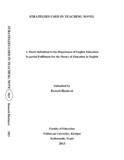Please use this identifier to cite or link to this item:
https://elibrary.tucl.edu.np/handle/123456789/1857| Title: | Strategies Used in Teaching Novel |
| Authors: | Bhattarai, Ramesh |
| Keywords: | Realistic Novel;Social Novel;Historical Novel;Epistolary Novel |
| Issue Date: | 2013 |
| Publisher: | Faculty of Education |
| Abstract: | The present study entitled ' Strategies Used in Teaching Novel ' is an attempt to find out strategies used by the lecturers of Bachelor level (B.Ed) while teaching novel. The main objective of the study was to find out the strategies employed by EFL teachers at the Bachelor level in teaching novel. Moreover, it also tried to discover the effective strategies for teaching different aspects of a novel, for example, vocabulary teaching, diving the text. The major tools of data collection were questionnaire and interview. The primary data was collected from 40 English teachers of bachelor level who were teaching English as major subject of Kathmandu and Lalitpur districts. They were selected purposively. The collected data were analyzed and interpreted using simple descriptive and statistical tools. The study found that the strategies mostly used in novel teaching were, contextualization, chapter division, summarizing, guessing the plot, characterization, video playing, and use of mother tongue occasionally, reading comprehension and project work assignment, simplification of plot. Moreover, most of the teachers focused on the language of the novel rather than plot. Among 12 strategies used by the teachers while teaching novel, ‘Briefing the background of the novel’ was the mostly used strategy whereas ‘providing the books of Foreign writers’ was the least used one. Furthermore, novels were found to be used for the enhancement of learner’s linguistic competence and at the same time language related problems were found to be the one causing difficulty in novel teaching and learning. The research consists of four chapters. The first chapter deals with the study of the general background, review of the related literature, objectives and significance of the study. Second chapter deals with the methodology that consists of sources of data, sampling procedure, tools for data collection, process of data collection and limitations of the study respectively. Similarly, third chapter deals with an analysis and interpretation of the data collection. The fourth chapter deals with the findings, recommendations and pedagogical implications. In the final part of the thesis, references and appendices have been included systematically. |
| URI: | http://elibrary.tucl.edu.np/handle/123456789/1857 |
| Appears in Collections: | English Language Education |
Files in This Item:
| File | Description | Size | Format | |
|---|---|---|---|---|
| THESIS.pdf | 738.98 kB | Adobe PDF |  View/Open |
Items in DSpace are protected by copyright, with all rights reserved, unless otherwise indicated.
